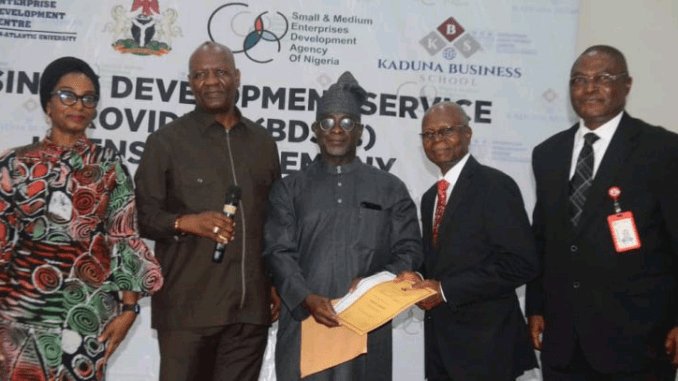150 Business Development Service Providers (BDSPs) have been certified by the Small and Medium Enterprise Development Agency of Nigeria (SMEDAN stimulate the growth of Micro, Small and Medium Enterprises (MSME) in Nigeria.
The Minister of State for Industry, Trade and Investment (FMITI), Hajia Mariam Katagum, at the virtual presentation in Lagos, said the certification programme for trained and practicing BDSPs was important for the continuous growth of MSMEs in the country.
In a statement, Katagum, represented by Mr. Adewale Bakare, Director, Industry Development, FMITI said that the Ministry was at the forefront of efforts to create a platform for enthroning professionalism with the BDSP ecosystem in Nigeria.
According to her, only certified BDSPs will be permitted to provide capacity building, mentorship, counseling, and other forms of BDS to MSMEs in Nigeria. This was agreed upon by the ministry and other pertinent stakeholders within the MSME sub-sector in Nigeria.
She went on to state that the names of the second group of authorized Business Development Service Providers would be made public online by SMEDAN.
For all current and potential users of BDSPs in Nigeria, Katagum claims that there will be posting of extra social media handles and distinctive advertisements in important publications in Nigeria.
She advised accredited BDSPs to take advantage of the chance to address the problems facing MSMEs in Nigeria.
According to Mr. Olawale Fasanya, director-general of SMEDAN, certification will give future and current BDSPs the chance to demonstrate their technical proficiency in support of MSMEs in Nigeria.
“The posting on other social media handles and special advertisements in major newspapers in Nigeria for all current and potential users of BDSPs in Nigeria to draw from will be effected as soon as possible.
“In addition, to show commitment and sincerity of purpose, the Agency will ensure that, going forward, being a certified BDSP will now be one of the criteria for bidding for capacity building programmes in the Agency,” he said.
He revealed that SMEDAN in its determination to address the challenges confronting the MSMEs in Nigeria in a holistic manner,was implementing the One Local government One Product (OLOP) initiative in one hundred and nine (109) senatorial districts in the country.
“This ambitious effort of the Agency is based on the successful implementation of the pilot phase of the OLOP programme in Katsina, Kaduna, FCT, Osun and Anambra States three years ago.
“The intervention activities under OLOP, among others, include access to workspace, equipment support, access to working capital, and capacity building,” he said.
He added that in the same vein, the agency was implementing the Conditional Grant Scheme (CGS) for micro enterprises in Nigeria.
“This programme is aimed at formalising a majority of the nano and micro enterprises that are mostly operating in the informal sector.
“This programme, which involves capacity building, registration of the micro enterprises with the CAC, provision of micro insurance, opening of bank accounts and provision of grants (N50,000 each) has so far been implemented in 22 States where over 40,000 entrepreneurs have been impacted,” he said.
Meanwhile, the Director General, National Agency for Food and Drug Administration and Control (NAFDAC), Prof. Chistianah Adeyeye, said NAFDAC had created 50 per cent discount for MSME registration to encourage more participants in the profession.
Chairman, Federal Inland Revenue Service (FIRS), Mr Muhammad Nami, represented by the Director of State, FIRS, Mr Abubakar Muhammed, applauded the effort of the awardees and assured them of the service’s continuous collaboration.
He said the service had enacted a lot of polices and platforms such as 10 per cent discount for about 20 million business development services.
The Director, Enterprise Development Centre, Pan Africa Atlantic University, Dr Peter Bankole, appreciated SMEDAN for its professionalism, saying that the network would ease challenges encountered by MSMEs in Nigeria.
He urged participants and awardees to operate with due diligence, adding that they would be recertified every three years for proper checks and balances.









